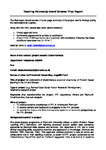An exploration of physiotherapy students’ experience of Problem Based learning in the UK and Greece
| dc.contributor.author | Hornsby, Claire | |
| dc.contributor.author | May, S | |
| dc.contributor.author | Roberts, A | |
| dc.contributor.other | Faculty of Health & Human Sciences | en_US |
| dc.date.accessioned | 2018-08-17T13:01:54Z | |
| dc.date.available | 2018-08-17T13:01:54Z | |
| dc.date.issued | 2014 | |
| dc.identifier.uri | http://hdl.handle.net/10026.1/12169 | |
| dc.description | File replaced (incorrect version) on 28/7/2022 by KT (LDS). | |
| dc.description.abstract |
To explore students experiences of PBL in Athens and Plymouth To identify barriers and facilitators to engaging in the PBL process To identify the impact of different educational systems on students’ perspectives on the PBL process Background/context to project: The physiotherapy programme at Plymouth University utilises a hybrid Problem Based Learning (PBL) curriculum, with learning structured around patient case scenarios, supported by practical skills classes and lectures. The objectives of PBL are to foster clinical reasoning skills, acquisition retention and application of knowledge, (Norman and Schmidt, 1992; Barrows, 1984). This approach requires students to take an active and collaborative role in their learning; however, a recent CEPPL project conducted by the Physiotherapy Programme team at Plymouth suggested there is variability in students’ engagement with this process, with some appearing to find it more challenging to adapt to this learning approach, (Gunn et al, 2012). However, this study did not investigate this variability or identify factors which impacted on engagement. Previous studies have identified time pressures, workload, ability to search for relevant information and understand the breadth and depth of knowledge required, as stressors associated with PBL, (Solomon and Finch, 1998). Beaten et al, (2010) suggest that factors which influence the effectiveness of student-centred learning include teacher approach, perception of learning environment, student personality, self-confidence and self-efficacy. From September 2011, the physiotherapy programme has been franchised to Attico College, in Athens, Greece. Richardson (1994) suggests that students approach learning in a variety of ways and that cultural factors can have an impact on this approach. Anecdotal reports from student representatives in Athens suggests students may face additional challenges adapting to a new approach to learning. A greater understanding of the student experience of PBL will enable lecturing staff on both courses to identify students who are struggling with this process and develop effective strategies and training to support and facilitate students’ engagement with the process. Methods used: A qualitative approach was utilised. Data collection was undertaken via email interview and conducted by a research assistant. Thematic analysis of the interview transcripts identified the emergent themes. | en_US |
| dc.description.sponsorship | TFAS | en_US |
| dc.language.iso | en | |
| dc.publisher | University of Plymouth | en |
| dc.subject | PBL experience; Athens and Plymouth; email interview; thematic analysis | en_US |
| dc.title | An exploration of physiotherapy students’ experience of Problem Based learning in the UK and Greece | en_US |
| dc.type | Report | en_US |
| plymouth.date-start | 2013-2014 | en_US |


